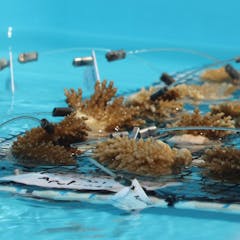
Articles sur Oceans
Affichage de 41 à 60 de 702 articles

Scientists found PFAS hot spots in Miami’s Biscayne Bay where the chemicals are entering coastal waters and reaching the ocean. Water samples point to some specific sources.

The same instruments used to measure earthquakes pick up vibrations as ocean waves put pressure on the sea floor. Four decades of data tell a story about ocean storms.

Giant eddy currents in the sea spread heat. But if trapped in place, they can cause marine heatwaves deadly to sea life. And there’s a big one shaping up off Sydney right now.

Could the data centres that power the internet be moved to the bottom of the ocean? It’s not as crazy as it sounds

The accumulation of synthetic pollutants found in the blubber of killer whales is impacting the marine mammals’ health. Urgent action is needed to tackle the issue.

More than 800 lives were lost in the Royal Charter storm but it also led to improvements in weather forecasting.

New research looks at how different species have managed to cross geographic barriers throughout history and whether their individual traits played a crucial role in these journeys.

Understanding how both cloud cover and temperature work to promote coral bleaching provides valuable insight into how reefs will change over various climate scenarios.

A climate overshoot that creates warmer oceans with lower oxygen levels will reduce the suitable habitat for many marine species long after CO₂ levels have peaked and declined.

Oceanographic systems vary over years, decades and centuries.

As oceans warm, Canada’s marine protections system looks woefully inadequate. New monitoring systems and flexible governance can help Canada protect the areas most likely to have the greatest impact.

Nigeria’s new marine and blue economy ministry has promise but it must be well run.

Coral has been incorporated into traditions, art and even religion in communities around the world.

Exploring the often unseen, and poorly understood, nuances of diversity within coral reefs may prove essential for ensuring the long-term health of Earth’s oceans.

Thousands of pearl octopuses were discovered in 2018 lining thermal vents near a deep-sea volcano. Researchers now know why octopus moms gather there.

New research shows that relatively large microplastic particles can make their way into the body tissues of marine mammals.

Ocean temperatures have hit record highs off the Florida Keys. Scientists and volunteer divers are racing to save these valuable creatures.

Recent headlines around the supposed impending collapse of the Atlantic currents remind us of the importance of avoiding sensationalism in facing global warming.

Rip currents are a leading cause of near-shore drownings, but there are effective ways to survive one. And these phenomena also play important ecological roles that are an emerging research area.

The predicted El Niño is a worry, but it doesn’t guarantee the record-breaking heat we’re seeing in parts of the Northern Hemisphere.
